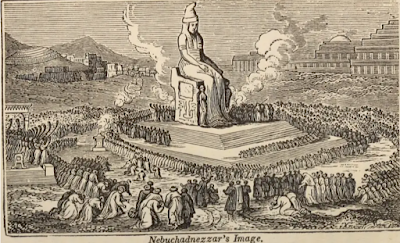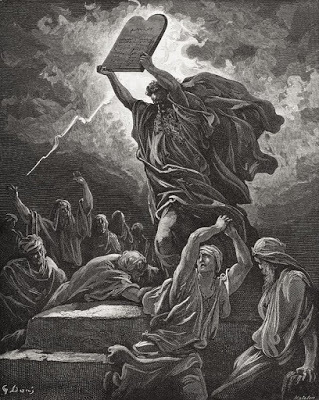Stephen Roney's Blog, page 261
January 18, 2020
William Blake on Social Justice
Blake is not always right, but in the end, I think he is the greatest philosopher that England has produced.
He does it in gnomic phrases.
He who would do good to another must do it in Minute Particulars: general Good is the plea of the scoundrel, hypocrite, and flatterer, for Art and Science cannot exist but in minutely organized Particulars.
So much for "social justice warriors."
'Od's Blog: Catholic and Clear Grit comments on the passing parade.
Published on January 18, 2020 09:26
The Third Commandment
 God creating the universe; from a 13th century English psalter.
God creating the universe; from a 13th century English psalter.“Remember the Sabbath day, to keep it holy. You shall labor six days, and do all your work, but the seventh day is a Sabbath to Yahweh your God. You shall not do any work in it, you, nor your son, nor your daughter, your male servant, nor your female servant, nor your livestock, nor your stranger who is within your gates; for in six days Yahweh made heaven and earth, the sea, and all that is in them, and rested the seventh day; therefore Yahweh blessed the Sabbath day, and made it holy.”
The Sabbath is a gift to man, as Jesus elsewhere asserts, rather than something that might go against our natural inclinations: who does not want a holiday? It seems odd, therefore, that it is in the Ten Commandments, as a moral imperative.
The commandment does go on to demand not only rest for ourselves, but for anyone in our employ, or under our direction. This may require self-sacrifice; it often seemed to under Ontario’s old “blue laws.”
But this does not explain why the commandment not only includes but leads with the need to rest ourselves.
It is perhaps therefore significant that unlike almost all the other commandments, it does not begin with the words “Thou shalt,” or “Thou shalt not.”
It begins with the word “remember.”
It is perhaps a call to what Buddhists call “mindfulness.” Although often misunderstood to mean attention to the immediately sensed, the original word translated “mindfulness” is actually closer to this English word: “remember.”
The Sabbath many be set aside for remembering. The sense of the first four words of the commandment may really be, “Remember on the Sabbath day, in order to keep it holy.”
Here in Exodus, in context of citing the commandment, we are reminded of the creation of the cosmos by God. When the commandment is reiterated in Deuteronomy, reference is made to the Passover and the escape from bondage in Egypt. We are called to remember these things.
“Remembering” here does not only mean our personal memories. It does not in Buddhist “mindfulness,” for to Buddhists each soul has memories of past lives in many realms of existence. And it demonstrably does not here—we do not personally remember either the creation or the exodus.
Limiting the memory to the personal is a modern convention, that Plato would have scorned as much as Jung. Memory in this Platonic sense assumes a vast store of innate knowledge. We are born, as Blake said, like a garden fully planted, programmed by the Creator.
But we need not go that far. Memory obviously includes not just personal sense experience, but all that we have read, or been taught, or even dreamt. It includes the stories that form us: the vast literary landscape of the Bible, the Odyssey, the Ramayana, Aesop’s fables, the legends, the fairy tales.
'Od's Blog: Catholic and Clear Grit comments on the passing parade.
Published on January 18, 2020 09:23
Iowa Forecast

My prediction: Bernie Sanders wins the Iowa caucuses. He is surging at just the right time. Warren’s attack on him for supposed misogyny will garner him sympathy votes. And the caucus system favours candidates whose supporters are more committed. Sanders’s supporters are.
I think Biden will disappoint. It is not just that his supporters are likely to be less fervent. The caucus system also favours those with second-choice growth potential. As the front runner and with his name recognition, and running on electability, those who are inclined to support him are already on board. As well, a huge proportion of the Iowa Democratic electorate are reported in polls as undecided. It more or less follows that they are looking for someone other than Biden, whom they all already know well.
This offers a big opening for a surprise by some dark horse candidate with really strong on-the-ground organization.
I think, thanks to her assault on Sanders, Warren will perform worse than expected, which may be a crippling blow to her candidacy. The proverbial wisdom is that only three candidates tend to remain viable after Iowa. If Warren badly underperforms expectations, her support naturally moves over to Sanders; and it handicaps his most dangerous regional rival in the New Hampshire primary soon to follow.
Buttigieg’s fifteen minutes have passed; I think his support is on the decline, and so he is unlikely to surprise in Iowa.
I look to some darker horse from the second tier to surprise, but I cannot predict which one.
'Od's Blog: Catholic and Clear Grit comments on the passing parade.
Published on January 18, 2020 08:00
January 17, 2020
The Second Commandment
 Something smells.
Something smells.“You shall not misuse the name of Yahweh your God, for Yahweh will not hold him guiltless who misuses his name.” (WEB)
Aka
“Thou shalt not take the name of the Lord your God in vain.”
This is ambiguous; so much so that Judaism has chosen to prohibit using the name of God, in any variant, in any circumstances, just to be safe. This is why English Bibles commonly refer to God as “Our Lord,” or “The Lord,” avoiding the use of the proper name.
But why is this a problem? Who is hurt by the misuse of a word? Would not, as Shakespeare said, a rose by any other name still smell as sweet?
It is commonly understood as a prohibition against making a false oath; against perjury, and against breaking promises or contracts. This seems reasonable, since in the Bible itself oaths are taken in the name of Yahweh.
But then, why not say so directly? Why be this circumspect?
Catholics believe this is a prohibition against cursing. Which again seems reasonable enough.
But again, why not say so directly?
Perhaps because it is about something more literal as well.
Literally, to misuse a name, or use a name in vain, is to apply it to the wrong person or thing: to look at a cat, for example, and call Puss a dog.
This may be an important issue; because Confucius, in the East, more or less makes it the first commandment in his moral system. Asked what would be his primary task if given power, he responded, “the rectification of terms.”
 Master Kung--Confucius.
Master Kung--Confucius.“A superior man, in regard to what he does not know, shows a cautious reserve. If names be not correct, language is not in accordance with the truth of things. If language be not in accordance with the truth of things, affairs cannot be carried on to success. When affairs cannot be carried on to success, proprieties and music do not flourish. When proprieties and music do not flourish, punishments will not be properly awarded. When punishments are not properly awarded, the people do not know how to move hand or foot. Therefore a superior man considers it necessary that the names he uses may be spoken appropriately, and also that what he speaks may be carried out appropriately. What the superior man requires is just that in his words there may be nothing incorrect.” – Analects 8:3:4-7, Legge trans.
This may not matter on the simple physical level: if you call a cat a dog, it just seems silly. If you call a rose a stinkweed, it fools no one. It increases in importance as the things referred to become more abstract; it matters a great deal more, for example, if you call lust love, or prejudice justice. The potential for deception is far greater, and the consequences far more severe.
Logically, then, the greatest danger begins with misidentifying the most important entity, God: and this can stand for the whole issue.
This is more or less the same point Orwell made with Newspeak in 1984. It is vital that language should always be in accord with objective reality, and not manipulated for political purposes. Otherwise you can just declare “freedom is slavery,” and start enslaving with abandon in the name of liberty. All manner of evil can thus be justified. Perhaps this is why, in turn the Devil himself is called the “Father of Lies.” Tinkering with the language itself is a kind of primordial meta-lie.
Jesus declares in the New Testament that “blasphemy against the Holy Spirit” is the one unforgivable sin. It is the same sin cited here:
“Then one possessed by a demon, blind and mute, was brought to him; and he healed him, so that the blind and mute man both spoke and saw. All the multitudes were amazed, and said, “Can this be the son of David?” But when the Pharisees heard it, they said, “This man does not cast out demons except by Beelzebul, the prince of the demons.”
Knowing their thoughts, Jesus said to them, “Every kingdom divided against itself is brought to desolation, and every city or house divided against itself will not stand. If Satan casts out Satan, he is divided against himself. How then will his kingdom stand? If I by Beelzebul cast out demons, by whom do your children cast them out? Therefore they will be your judges. But if I by the Spirit of God cast out demons, then God’s Kingdom has come upon you. Or how can one enter into the house of the strong man and plunder his goods, unless he first bind the strong man? Then he will plunder his house.
“He who is not with me is against me, and he who doesn’t gather with me, scatters. Therefore I tell you, every sin and blasphemy will be forgiven men, but the blasphemy against the Spirit will not be forgiven men. Whoever speaks a word against the Son of Man, it will be forgiven him; but whoever speaks against the Holy Spirit, it will not be forgiven him, either in this age, or in that which is to come.”
The sin itself is illustrated by the passage: the Pharisees, knowing that Jesus had exorcised by the power of the Holy Spirit, said it was done by the demon Beelzebul. They were, in effect, calling the Holy Spirit the Devil. They were taking the name of the Lord in vain.
 Jesus exorcises the man both blind and mute.
Jesus exorcises the man both blind and mute.There is another subtext here: what opens the eyes and allows us communication is from God; what closes the eyes and prevents effective speech is from Satan. Correct use of terms and concepts allows things to be seen clearly, and allows dialogue to occur.
Again, Jesus gathers together; Satan scatters. Devil, “dia-bol,” literally means “to scatter.” And an obvious instance of scattering is to separate the word from the object.
For every word is a “sym-bol,” a drawing of things together: most fundamentally, word and referent. The sound or visual character, and the thing it represents.
The image of the strong man being bound also seems relevant. Given the context, an exorcism, the plunderer would be the possessing demon. The demon gains possession of the will by first binding the self with the misapplication of terms.
This may be why, in turn, an essential act, perhaps the essential act, in any Christian or Muslim exorcism is getting the demon to clearly state his name. Rectify terms, and the possession must end.
Perhaps this is also why John the Baptist came before Jesus: in order to make the Truth apparent, we must first “make the ways straight for the Lord,” and this is a speech act. For that is what the Baptist does: he speaks. He is a herald.
This tendency to falsify language is, sadly, becoming endemic in our society. It is the driving force behind political correctness. Abortion is called “choice.” Government expenditures are “investments.” We are now required to assert that, if a man says he is a woman, he is a woman. And we must say he is, despite all appearances to the contrary, or face serious consequences. The list is growing faster than it can be enumerated. It is all, to quote Orwell, to “make lies sound truthful, murder respectful and to give an appearance of solidity to pure wind.”
There is another curious part of the passage. So curious it must hold some special meaning:
“If I by Beelzebul cast out demons, by whom do your children cast them out? Therefore they will be your judges. But if I by the Spirit of God cast out demons, then God’s Kingdom has come upon you.”
Why this reference to children? Would it not be more natural to say, “by whom did your fathers cast them out”? Wouldn’t that have made his point stronger, showing that this was established usage? Wouldn’t it be more natural to warn that their forefathers, not their children, would judge them for such a sin? Do children commonly judge the acts of parents?
It seems there is something peculiar about this sin that inverts this more natural order.
It sounds like Hans Christian Andersen’s fable of “The Emperor’s New Clothes.”

The sincerity of a child is a threat to any corrupt social order based on a shared falsification of terms. Given such a situation, in which fundamental concepts are being falsified, it is children who are going to be best able to spot it. Because they are looking at it all with fresh eyes, without preconceptions—in this case, falsified preconceptions.
This may be why “a child shall lead us,” as the New Testament says. This may be why Jesus says “suffer to come unto me the little children; for of such is the Kingdom of God.”
This may explain in turn why, as Freud and many others have observed, it is the brightest and most perceptive children who come to be abused in any dysfunctional family.
'Od's Blog: Catholic and Clear Grit comments on the passing parade.
Published on January 17, 2020 07:32
He Who Pays the Harper Picks the Tune
Stephen Harper has resigned from his Conservative Party post in order to fight against Jean Charest getting the Conservative leadership.
And if Harper does not like Charest, it seems unlikely that MacKay would be his choice either. Both are “Red Tories.”
Tom Mulcair brings up another rap against MacKay. Rona Ambrose is sitting out it seems in part because her French is weak. She caught flak for that during her interim leadership. But MacKay’s French is weaker still.
Which, Tom Mulcair points out, raises an interesting possibility. What happens if no one else looks like they can beat Charest? Might Harper himself run?
'Od's Blog: Catholic and Clear Grit comments on the passing parade.
Published on January 17, 2020 05:35
January 16, 2020
The Book of Consolation
'Od's Blog: Catholic and Clear Grit comments on the passing parade.
Published on January 16, 2020 13:50
All the Way with Jean Charest?
 The new frontrunner.
The new frontrunner.Peter MacKay has, as expected, entered the Conservative leadership race. He becomes the front runner.
I am not keen on Peter MacKay.
He won the Progressive Conservative leadership years ago by cutting a secret backroom deal with David Orchard. The deal was, in large part, that he would not, under any circumstances, allow the PCs to merge with the Canadian Alliance.
This was in May, 2003. In October, 2003, MacKay merged the party with the Canadian Alliance.
It was a historic display of lack of principle.
Why would we want such a man as prime minister?
To be clear, I was delighted at the party merger. The real problem was the original pact with Orchard, which sold out the party and the conservative movement for personal ambition. But this was then compounded by the breach of trust.
MacKay is all about MacKay.
One pressing issue in the current leadership race is that the new leader must be ready to hit the ground running, to assume the prime ministership at any moment. This is a minority government situation. There will be little time to find their feet, little time to introduce themselves to the public.
This looks like a MacKay strength, because of his long resume; but his conduct as PC leader suggests otherwise. He won a leadership, and within a year surrendered it. It looks as though he really had no idea or plan for what to do with it.
It looks as though he is not temperamentally a leader.
Also in the race, so far, are Pierre Poilievre and Erin O’Toole.
Poilievre looks great in parliament; he is fluently bilingual, and has Western roots. Yet I fear he is handicapped by this vital consideration, that the new leader be ready to assume command. Poilievre’s talent is in opposition. One remembers John Diefenbaker: the segue into government is not an easy one, it is in many ways an opposite role, and Dief turned out not to have the personality for it.
Poilievre would have made better sense last time, when the task appeared to be to rally forces for a long haul in opposition.
He might be great, but it’s a bit of a shot in the twilight.
I like O’Toole. However, he too is not ready for this. He only came third last time, in a weaker field. His government experience is as Minister of Veterans Affairs, not a major portfolio. He has no natural regional power base—coming up through the military means he is not really from anywhere.
Jean Charest has not announced, but rumours are swirling around him.
I like Jean Charest. He has at least as impressive a resume as MacKay; and it includes actual governing experience, as Quebec premier.
Yet there seems to be a lot of resistance to him within the party. I think there is a special resentment, in the West, towards there being so many national leaders from Quebec. They feel, by comparison, excluded.
One can sympathize, but in pragmatic terms, Quebec is important; it has a lot of seats. The Tories already have the West secured; Atlantic Canada is not seat-rich; and Ontario too likes leaders from Quebec, while Quebec is not impressed by leaders from Ontario.
Somebody has crafted a pre-emptive assault by pointing out that Charest has been advising Huawei. This supposedly makes him a Manchurian candidate. Kind of like Trump with Russia.
I’m not impressed by this claim either. My greatest criticism of the current, Trudeau, government, is that it has been trying to hector other countries on how they should conduct their business. Given Canada’s lack of either financial or military might, this does no good for anyone, and only harm to Canadians. I’d rather stick to trying to be friends to everyone, and being fair to everyone. And doing business with everyone.
Stephen Harper, rumours say, also strongly resists Charest’s bid. He has just resigned from the Conservative National Fund, reputedly so he is free to work against Charest.
I think this is a matter of protecting his legacy; if Charest wins, it will no longer be Stephen Harper’s party. It will be the old Progressive Conservatives again.
I too would prefer it to remain in Harper’s mold. And, frankly, I am probably not going to vote Conservative next time, with Charest or any of the others here as leader. But this is also an indication of how competent a leader Charest is. MacKay too comes from the old PC, yet Harper does not so fear him.
At this point, I think the CPC would do best to choose Charest.
'Od's Blog: Catholic and Clear Grit comments on the passing parade.
Published on January 16, 2020 05:59
January 15, 2020
The Trouble with Truth
The mainstream media seems not to like Bernie Sanders. He essentially was called a liar in last night’s debate—by the moderators.
He was treated unfairly in 2015 as well, by the Democratic National Committee. Then, it made sense purely on the premise that the DNC was owned by the Clintons, that they maintained great influence in the party.
This time, we need a deeper explanation. It’s not just the Clintons.
It is not that Sanders is feared ideologically and in terms of electability, for being too far to the left. For they have given the same sort of blatantly biased treatment to Andrew Yang and Tulsi Gabbard, with somewhat different platforms. Either would probably better appeal to independents that the candidates the MSM and DNC support.
The clue is in what they just publicly accused Sanders of: lying.
They accuse Gabbard of something similar: of not really speaking for herself, but of mouthing lines fed to her by the Kremlin. Of insincerity.
This is more conspicuous because the big draw for Bernie’s supporters is that he seems so sincere. He has been consistent in what he says, pretty much throughout his career. This is rare in a politician.
This is also what he shares with the two other pariah Democratic candidates: Tulsi Gabbard and Andrew Yang also seem sincere, consistent, and to be expressing their own real views. Gabbard seems to stand on principle. She blew the whistle, for example, on the unfair treatment of Sanders last time, even though they do not closely align ideologically.
It is this very honesty that the party poobahs and the media elite fear and hate.
It is, in fact, also what they hate so much in Trump. They endlessly accuse him of lying, just as they now do Sanders. They accused him of being a Russian puppet, as they now do Gabbard. Same phenomenon. But in fact, Trump has been conspicuous in keeping his campaign promises. And, more generally, for not bending to polls or political correctness, but saying what he genuinely thinks. For speaking the truth as he sees it.
Why do these groups, the media and the Democratic operatives, so fear sincerity? Why do they actually prefer phonies as candidates?
They might and do say, of such candidates, that they are “loose cannon.” Who knows then what they might say or do on a given issue? Seems risky.
But this again is actually the inverse of the truth. Because they do not blow in the wind, because they operate on principles, we really know better how these four will react to any given new event.
The real problem is the one outlined in the Gospel of John. Those who do evil in darkness come to fear the light for its own sake, and will oppose anyone who speaks the truth.
This is why they crucified Christ.
The DNC and the legacy media—our social elites in general--are in a very dark place.
'Od's Blog: Catholic and Clear Grit comments on the passing parade.
Published on January 15, 2020 14:34
Prince Harry as Surrogate Royal
Maclean's is suggesting the same thing I have--that Harry and Meghan be used for ceremonial functions in place of the Governor-General.
This could then justify paying for their security detail; they would be earning it.
'Od's Blog: Catholic and Clear Grit comments on the passing parade.
Published on January 15, 2020 07:39
The First Commandment
 Idolatry
Idolatry“I am Yahweh your God, who brought you out of the land of Egypt, out of the house of bondage.
“You shall have no other gods before me.
“You shall not make for yourselves an idol, nor any image of anything that is in the heavens above, or that is in the earth beneath, or that is in the water under the earth: you shall not bow yourself down to them, nor serve them, for I, Yahweh your God, am a jealous God, visiting the iniquity of the fathers on the children, on the third and on the fourth generation of those who hate me, and showing loving kindness to thousands of those who love me and keep my commandments."
The focus of this blog has largely become ethics. This is not intentional; circumstances in the passing parade have forced this to the fore.
Perhaps, then, it is time to look at the basic rules of Judeo-Christian morality, and understand exactly what they say.
Above is the full text of the First Commandment, as Catholicism numbers them, taken from the Book of Exodus; World English Bible translation.
Note firstly that it does not deny the existence of gods other than Yahweh. This is a common misconception. The commandment is that they must not be given priority over Yahweh, must not be “before him.” Other gods are understood as daemons, demons—real spiritual beings with real, limited power. If not necessarily positively malign, they are amoral. They are not the friends of man. This describes the Greek gods of legend.
Then there is the prohibition against “graven images.” This is taken quite literally in some forms of Islam, and Protestants regularly criticise Catholics for having statues of the saints, as supposedly violating this commandment.
But the Bible, and Yahweh, clearly do not literally mean that there is something wrong with visual arts. For in this same Book of Exodus, Yahweh commands Moses to fashion a bronze serpent and raise it above the Hebrews on a pole. This seems to preempt such an understanding.
 Not idolatry
Not idolatryMore pointedly, the Bible itself is a set of “graven images”—for that is what any written language is. So were the tablets Moses brought down from Sinai—so is this very commandment. The Book of Exodus even refers to the tablets as “graven.”
 Not idolatry.
Not idolatry.The prohibition, then, is not against making graven images, but worshipping them.
And then again, is even this quite literal? Does anyone ever really worship a literal image? The whole point of an image is that it represents something else. So anyone who worships an image instead of what it represents is simply making an obvious error. It is more or less self-evident. There are not actual little people in your TV set, for example.
So the real prohibition must be against worshipping “anything that is in the heavens above, or that is in the earth beneath, or that is in the water under the earth.”
That is, it is against worshipping material things, things immediately present to the physical senses.
In a word, it is against worshipping “nature.”
Which is obviously a temptation, because it is a temptation into which most people fall currently.
It is a prohibition against worshipping “science,” or “nature,” or “ecology,” or “Gaia,” or “the Earth,” or “the environment.” Or physical health and comfort, and not our souls.
These things are no doubt, like the pagan gods, of some significance. But we must not put them above the spiritual, or above man himself.
And what is their significance? The reference to graven images expresses it. To worship the seen world or any part of it instead of the invisible spiritual world is just like mistaking the image for the reality it represents.
'Od's Blog: Catholic and Clear Grit comments on the passing parade.
Published on January 15, 2020 07:12



